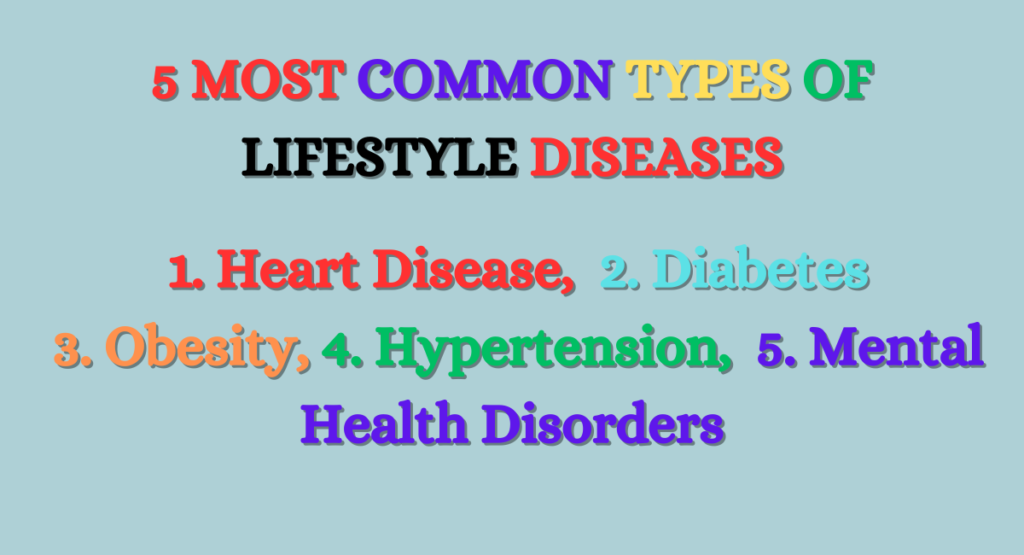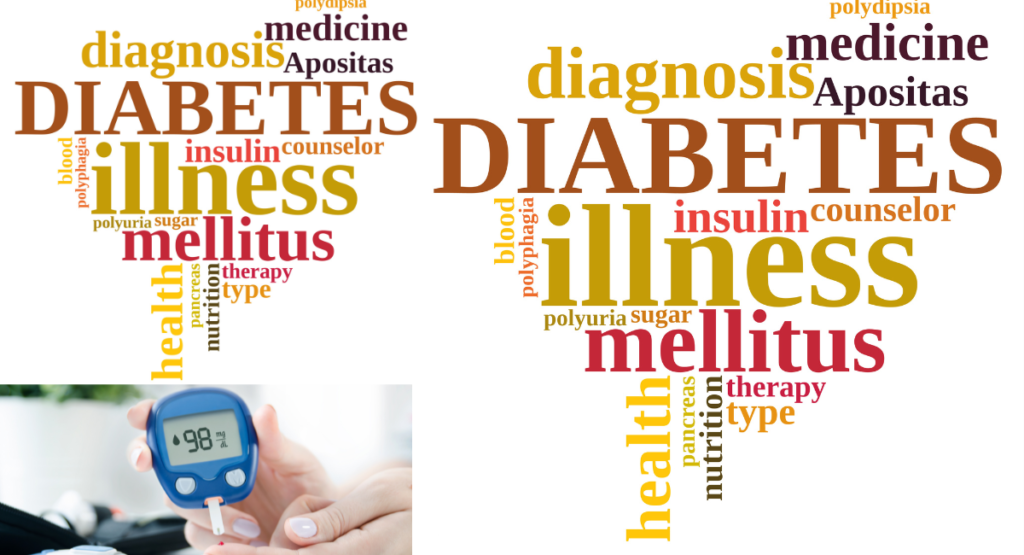5 MOST COMMON TYPES OF LIFESTYLE DISEASES: SIGNS AND SYMPTOMS, CAUSES, PREVENTION, AND TREATMENT
In our fast-paced, modern world, the choices we make in our day-to-day lives significantly impact our health. Lifestyle diseases, often fueled by sedentary habits, poor nutrition, and high-stress levels, have become increasingly prevalent. In this article, we’ll delve into the various facets of lifestyle diseases, from recognizing signs and symptoms to understanding causes, prevention, and treatment.
Introduction to Lifestyle Diseases
In the hustle and bustle of contemporary life, lifestyle diseases have emerged as silent culprits affecting millions worldwide. These diseases, including heart disease, diabetes, and obesity, are often linked to the way we live, eat, and manage stress. As we navigate through the complexities of these conditions, it becomes imperative to understand their signs, causes, and most importantly, how to prevent and treat them.

5 Common Types of Lifestyle Diseases
Let’s start by identifying some of the most common lifestyle diseases that significantly impact our well-being.

1. Heart Disease:
Known as the leading cause of death globally, heart disease encompasses conditions like coronary artery disease and heart failure.

2. Diabetes:
A metabolic disorder characterized by elevated blood sugar levels, diabetes requires vigilant management for a healthy life.

3. Obesity:
As a consequence of sedentary lifestyles and poor dietary choices, obesity has far-reaching effects on health, affecting organs and overall mobility.

4. Hypertension:
Often a silent killer, hypertension, or high blood pressure, is a precursor to severe cardiovascular issues.

5. Mental Health Disorders:
Conditions like depression and anxiety, closely linked to lifestyle choices, contribute to the global burden of disease.
Signs and Symptoms
Recognizing the early signs and symptoms of lifestyle diseases is pivotal for timely intervention and management.
1. Fatigue and Persistent Weakness:
Feeling constantly tired or weak may indicate an underlying issue with heart health or other lifestyle-related conditions.
2. Increased Thirst and Frequent Urination:
Common signs of diabetes, excessive thirst, and frequent urination shouldn’t be ignored.
3. Shortness of Breath:
A symptom often associated with heart disease, shortness of breath may signal an impending issue.
4. Unexplained Weight Gain or Loss:
Sudden fluctuations in weight can be indicative of an underlying metabolic imbalance.
5. Persistent Headaches and Anxiety:
Frequent headaches and heightened anxiety may be linked to both mental health and cardiovascular issues.
Causes of Lifestyle Diseases
Understanding the root causes of lifestyle diseases empowers us to make informed choices for a healthier future.
1. Unhealthy Diet:
Diets high in processed foods, saturated fats, and added sugars contribute to the development of various lifestyle diseases.
2. Lack of Physical Activity:
Sedentary lifestyles devoid of regular exercise pave the way for obesity, heart disease, and other health issues.
3. Chronic Stress:
Prolonged exposure to stress triggers physiological responses that can lead to hypertension and mental health disorders.
4. Genetics:
While lifestyle choices play a significant role, genetic factors can also predispose individuals to certain lifestyle diseases.
Preventive Measures
Taking proactive steps to prevent lifestyle diseases is the cornerstone of a healthier life.
1. Balanced Diet:
Prioritize whole foods, fruits, vegetables, and lean proteins to ensure a well-rounded and nutritious diet.
2. Regular Exercise:
Incorporate regular physical activity into your routine, whether it’s brisk walking, jogging, or engaging in your favorite sport.
3. Stress Management:
Adopt stress-relief practices such as mindfulness, meditation, or yoga to maintain mental well-being.
4. Routine Health Check-ups:
Regular health check-ups aid in the early detection and prevention of lifestyle diseases.
Treatment Options
When lifestyle diseases strike, a combination of medical and lifestyle interventions is often necessary.
1. Medications:
Physicians may prescribe medications to manage conditions like hypertension or diabetes effectively.
2. Lifestyle Modifications:
Adopting healthier habits, including dietary changes and increased physical activity, is fundamental to disease management.
3. Surgical Interventions:
In severe cases, surgical procedures may be recommended to address conditions like heart disease or obesity.
Holistic Approaches to Managing Lifestyle Diseases
Recognizing the interconnected nature of our well-being, holistic approaches play a vital role in managing lifestyle diseases.
Integrative Medicine:
Blending conventional and alternative therapies can provide a more comprehensive approach to disease management.
Mind-Body Practices:
Incorporating practices like acupuncture, massage, or aromatherapy contributes to both mental and physical health.
Nutritional Therapy:
Working with nutritionists to create personalized dietary plans can significantly impact disease management.
Impact of Lifestyle Choices on Health
Every daily choice, from what we eat to how we manage stress, plays a crucial role in our overall health.
The Food-Health Connection:
Understanding how nutrition impacts our body’s functions highlights the importance of mindful eating.
Physical Activity as a Pillar:
Regular exercise not only aids in weight management but also boosts cardiovascular and mental health.
The Stress-Health Equation:
Balancing stress through healthy coping mechanisms is integral to preventing related health issues.
Real-life Stories
Let’s draw inspiration from individuals who transformed their lives through conscious lifestyle choices.
John’s Journey to Heart Health:
By adopting a plant-based diet and regular exercise, John reversed his heart disease and now enjoys an active life.
Emma’s Triumph Over Diabetes:
Through consistent monitoring, a balanced diet, and an active lifestyle, Emma manages her diabetes effectively.
Joe’s Weight Loss Adventure:
With dedication to healthy eating and exercise, Joe shed excess weight, eliminating the risks associated with obesity.
The Role of Mental Health
Understanding the intricate link between mental health and lifestyle diseases is paramount.
Stress as a Silent Culprit:
Chronic stress contributes to the development and exacerbation of various lifestyle diseases.
Mindfulness and Disease Prevention:
Incorporating mindfulness practices reduces stress, positively impacting overall health.
Creating Sustainable Habits
Let’s explore practical ways to integrate lasting lifestyle changes.
Gradual Changes for Lasting Impact:
Small, consistent adjustments to your routine are more likely to result in sustainable habits.
Building a Support System:
Engage with friends, family, or a community to foster a supportive environment for healthy living.
Community and Social Support
Recognizing the power of community in disease prevention and management.
Group Exercise Initiatives:
Joining group fitness activities fosters a sense of community and encourages regular physical activity.
Sharing Nutritional Insights:
Exchange healthy recipes and nutritional tips within your social circles to promote better eating habits.
Technology and Lifestyle Disease Management
Leveraging technology for an enhanced approach to health.
Health Apps and Wearables:
Explore the myriad of apps and wearables that track health metrics, providing valuable insights.
Virtual Health Communities:
Join online communities where individuals share experiences, tips, and motivation for healthier living.
Challenges in Lifestyle Disease Management
Acknowledging and overcoming common challenges on the path to better health.
Time Constraints:
Strategies for incorporating healthy habits into busy schedules.
Overcoming Unhealthy Temptations:
Tips for resisting unhealthy food choices and sedentary behaviors.
Staying Motivated:
Maintaining motivation for long-term lifestyle changes.
Conclusion
As we navigate the landscape of lifestyle diseases, the power to make impactful choices lies in our hands. By understanding the signs, causes, and prevention measures, we pave the way for a healthier and more fulfilling life. Remember, it’s the cumulative effect of small, positive choices that leads to lasting well-being.
FAQs:
1. Can lifestyle diseases be completely prevented?
– While complete prevention may not be guaranteed, adopting a healthy lifestyle significantly reduces the risk of developing lifestyle diseases.
2. Are lifestyle diseases reversible through lifestyle changes alone?
– In many cases, yes. Positive lifestyle changes can reverse or effectively manage various lifestyle diseases.
3. How often should one go for health check-ups to detect lifestyle diseases early?
– Annual health check-ups are advisable, but frequency may vary based on individual health risks and age.
4. Is medication always necessary for managing lifestyle diseases?
– Medication is prescribed based on the severity of the condition. Lifestyle changes are often essential components of comprehensive disease management.
5. Can children develop lifestyle diseases?
– Yes, lifestyle diseases can affect children, emphasizing the importance of instilling healthy habits from a young age.






